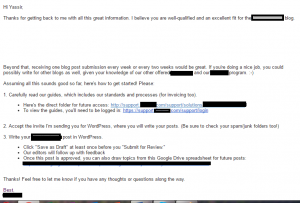Throughout history, many freelance writers like Vladimir Nabokov, Joseph Conrad and Lin Yutang have left their mark in the world of freelance writing.
What did they have in common? They were all non-native English speakers (freelance writers who use English as a second language or ESL Writers) and they achieved freelance writing success despite English being a second language.
The trend of ESL Writers entering the world of freelance writing has continued in the past few decades. Bamidele Onibalusi, Mridu Khullar Relph and Walter Akolo are examples of successful ESL writers who have claimed their spot in the den of freelance writing.
Therefore, if you’re still complaining about being a non-native English writer, you’re in deep trouble.
Now, you might be thinking, “Well, I’m not a genius like them.” If that’s you, I suggest you head over to Nick’s brilliant post “6 Mindsets You Need to Adopt to Become a Successful Freelance Writer“.
After cleaning up your mind, here are three must-know facts about freelance writing for ESL writers.
#1: One Year Is More Than Enough to Start Crushing It
As I mentioned in our recent post, “Meet The WriteWorldwide Team,” I’ve been learning English since August 2015.
After one year of struggling to put words together (click here to read my first article in English–total crap,) asking stupid questions on forums and arguing with my English teacher that “informations” does exist in English (I truly am sorry, teacher!) I joined Bamidele Onibalusi’s “Earn Your First $1,000 as a Freelance Writer” challenge and landed my first well-paying client in August 2016 after Anita Smith from Precision Editing Services edited my 1000 word post (which I spent twenty days writing.)

You see that? With no English courses, no travelling, no bachelor of literature and no freaking rocket science, I’ve been able to kick-start my freelance writing business in just one year by following the same strategies we share with you on our blog.
#2: Social Proof is a Piece of Cake

I used the credentials above for social proof to land my first client. The blogs I mentioned, The Huffington Post and Th3 Pro, are Arabic. But the social proof they gave me is the key.
You can also write for some other major publications in your native language or a language you mastered. Look for a translated version of an English magazine in your niche, pitch it (in other words, send them an e-mail to express your interest in writing for them), and get featured.
It’s as simple as that.
If you speak Arabic, you can easily get featured in major magazines such as The Huffington Post, Forbes, Entrepreneur and National Geographic. The same rule applies with Spanish and French.
Social proof is the only thing that separates the beginner from the advanced freelance writer, so make sure you take this huge leap.
#3 International Companies Are in Need of Your Knowledge
You have one very valuable leg-up on native English freelance writers. Everyone wants to sell to the American and Canadian markets because they are more lucrative; therefore, being a trained non-native English writer (or copywriter) who understands American culture, you could work for national companies to help them translate their materials and break into the North American markets.
The reverse is also true. Depending on your industry specialisation, you might work for American companies wanting to break into national and local speaking markets in your country.
One of the most successful examples of this business model is Andy Recht and Alex Talavera’s website, Aphra. They connect companies and help them break the gaps with their international partners and target markets.
Bottom line: Take a step back and realise that being a writer who uses English as a second language is a blessing, not something that should frustrate you. You only need a MAXIMUM of one year to make your freelance writing endeavours become a reality. So, take action!




Thanks, great article.
I’m happy you like it, Bablofil! Thanks for commenting.
I’m like wow! So they’re not superhuman as I thought.
You know even though I’ve a B.A in english, I’m still hesitant to take on english writing tasks.
Most of the times, I do french writing. Thank for this amazing post.
Hi Mouka! Thanks for your comment.
Check out our new post in hiring an editor, I’m sure that you’ll love it:
https://writeworldwide.com/brief-guide-hiring-editor-non-native-english-freelance-writer/
Cheers!